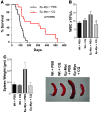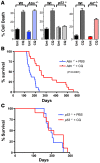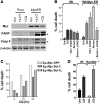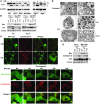Targeting lysosomal degradation induces p53-dependent cell death and prevents cancer in mouse models of lymphomagenesis
- PMID: 18097482
- PMCID: PMC2148253
- DOI: 10.1172/JCI33700
Targeting lysosomal degradation induces p53-dependent cell death and prevents cancer in mouse models of lymphomagenesis
Erratum in
- J Clin Invest. 2008 Apr;118(4):1584
Abstract
Despite great interest in cancer chemoprevention, effective agents are few. Here we show that chloroquine, a drug that activates the stress-responsive Atm-p53 tumor-suppressor pathway, preferentially enhances the death of Myc oncogene-overexpressing primary mouse B cells and mouse embryonic fibroblasts (MEFs) and impairs Myc-induced lymphomagenesis in a transgenic mouse model of human Burkitt lymphoma. Chloroquine-induced cell death in primary MEFs and human colorectal cancer cells was dependent upon p53, but not upon the p53 modulators Atm or Arf. Accordingly, chloroquine impaired spontaneous lymphoma development in Atm-deficient mice, a mouse model of ataxia telangiectasia, but not in p53-deficient mice. Chloroquine treatment enhanced markers of both macroautophagy and apoptosis in MEFs but ultimately impaired lysosomal protein degradation. Interestingly, chloroquine-induced cell death was not dependent on caspase-mediated apoptosis, as neither overexpression of the antiapoptotic protein Bcl-2 nor deletion of the proapoptotic Bax and Bak affected chloroquine-induced MEF death. However, when both apoptotic and autophagic pathways were blocked simultaneously, chloroquine-induced killing of Myc-overexpressing cells was blunted. Thus chloroquine induces lysosomal stress and provokes a p53-dependent cell death that does not require caspase-mediated apoptosis. These findings specifically demonstrate that intermittent chloroquine use effectively prevents cancer in mouse models of 2 genetically distinct human cancer syndromes, Burkitt lymphoma and ataxia telangiectasia, suggesting that agents targeting lysosome-mediated degradation may be effective in cancer prevention.
Figures






Comment in
-
Antimalarial therapy prevents Myc-induced lymphoma.J Clin Invest. 2008 Jan;118(1):15-7. doi: 10.1172/JCI34503. J Clin Invest. 2008. PMID: 18097478 Free PMC article.
References
-
- Lowe S.W., Sherr C.J. Tumor suppression by Ink4a-Arf: progress and puzzles. Curr. Opin. Genet. Dev. 2003;13:77–83. - PubMed
-
- Giaccia A.J., Kastan M.B. The complexity of p53 modulation: emerging patterns from divergent signals. Genes Dev. 1998;12:2973–2983. - PubMed
-
- Kastan M.B., Bartek J. Cell-cycle checkpoints and cancer. Nature. 2004;432:316–323. - PubMed
Publication types
MeSH terms
Substances
Grants and funding
LinkOut - more resources
Full Text Sources
Medical
Molecular Biology Databases
Research Materials
Miscellaneous

